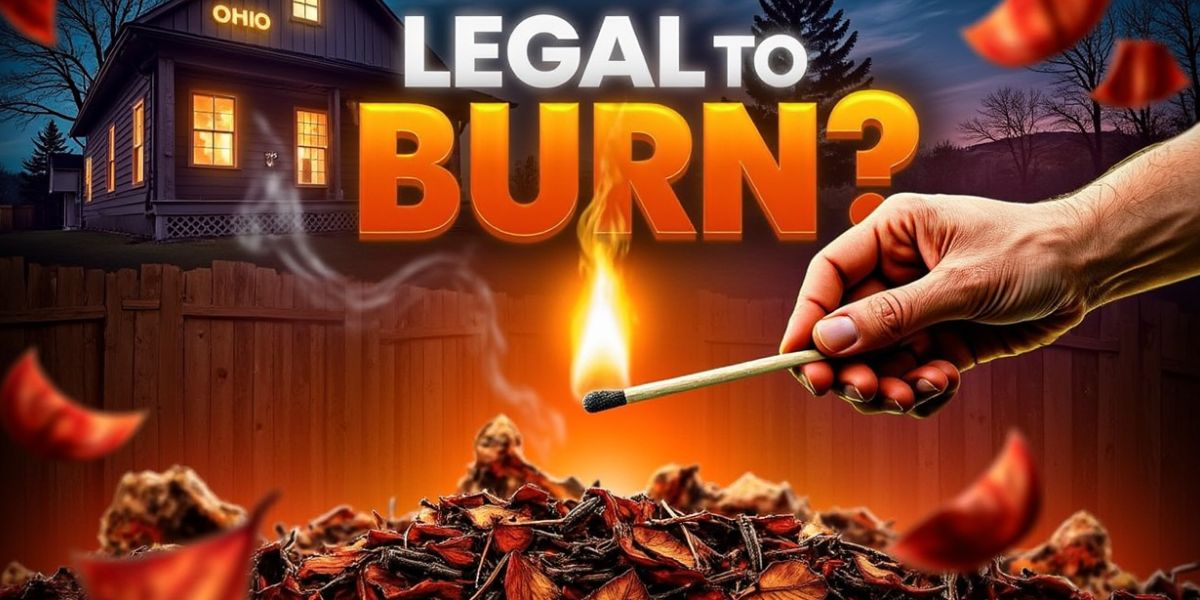In Ohio, burning on private property is a common method for getting rid of yard garbage or having a campfire in your backyard.
On the other hand, there are state legislation and local restrictions that govern open burning in order to safeguard the environment, public safety, and air quality.
If you are thinking about burning something on your property, here is some important information that you should be aware of to make sure that your actions are legal.
What does open burning mean?
Open burning is when you set fire to objects outside without using a containment device, such as a chimney or exhaust. Burning leaves, brush, or building waste in an open area are some examples.
Open burning is permitted in Ohio under certain conditions, although it is nonetheless subject to rigorous rules.
The Ohio Environmental Protection Agency (EPA) is responsible for regulating open burning legislation in order to decrease air pollution and lessen the risk of fires. If you do to follow these laws, you may be fined or face other consequences.
Things You Can and Cannot Burn
The following natural materials are usually allowed to be burned on your property in Ohio:
- Leaves
- twigs
- branches
- Tree trunks (when properly maintained)
However, the Ohio EPA restricts the burning of certain materials, including:
- Tires
- Plastics
- Rubber
- Construction and demolition
- debris
- Furniture
- Household
- garbage
- Dead animals
When you burn things that are not allowed, it emits harmful chemicals into the air and creates major health hazards for the people in your community.
When is it permissible to burn something?
The location and purpose of the burning determine how it is regulated. Open burning is usually more permissible in rural locations, while metropolitan or densely populated zones tend to have tougher regulations.
Burning is not allowed under certain situations, such as air pollution advisories or weather warnings for high winds and drought, regardless of where you are.
Requirements for Permits
Ohio does not have a statewide permit system for burning, but certain counties and municipalities do require permits. Make sure to check with your local fire department or government agency to find out if you need a permit before starting a fire.
In some rural regions, you can burn small mounds of yard waste without a permit as long as you follow the rules set by the state and local government.
Larger fires, particularly those that are set for the purpose of clearing land, may need to be approved by extra authorities.
Your Rights in California: What to Do If Your Car Is Towed from Private Property
Guidelines for Safe Open Burning
Even if burning is allowed, it is important to observe safety recommendations in order to protect yourself and your surroundings:
- Keep an eye on the fire: You should never leave a fire unattended.
- Select a secure location: Make sure that fires are at least 50 feet away from buildings, fences, and anything that can catch fire.
- Keep an eye on the weather: Do not burn on days that are windy or dry.
- Keep fire suppression tools close by: Make sure to have a water source, shovel, or fire extinguisher nearby.
- Extinguish thoroughly: Before leaving the area, be certain that the fire has been totally extinguished.
Consequences for Burning Illegally
If you break Ohio’s burning regulations, you could be fined and held responsible for any damages. If your fire spreads and causes damage to property or injury, you may also be subject to civil litigation.
Your Rights in Pennsylvania: What to Do If Your Car Is Towed from Private Property
Other Options Besides Open Burning
To prevent legal and safety problems, think about adopting other options such as composting yard trash or utilizing local waste collection services. Leaf collection services and yard debris drop-off facilities are available in many communities.
Final Thoughts
In Ohio, it is allowed to burn things on your property as long as certain conditions are met. It is essential to be familiar with state laws and municipal rules in order to comply with them.
Before starting a fire, make sure to consult with local authorities and always follow safety requirements. This way, you can maintain your property properly while also safeguarding your neighborhood and the environment.








